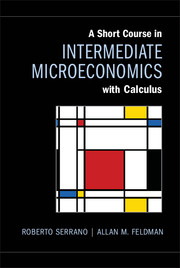Book contents
- Frontmatter
- Contents
- Preface
- 1 Introduction
- Part I Theory of the Consumer
- Part II Theory of the Producer
- Part III Partial Equilibrium Analysis: Market Structure
- 11 Perfectly Competitive Markets
- 12 Monopoly and Monopolistic Competition
- 13 Duopoly
- 14 Game Theory
- Part IV General Equilibrium Analysis
- Part V Market Failure
- Index
13 - Duopoly
from Part III - Partial Equilibrium Analysis: Market Structure
- Frontmatter
- Contents
- Preface
- 1 Introduction
- Part I Theory of the Consumer
- Part II Theory of the Producer
- Part III Partial Equilibrium Analysis: Market Structure
- 11 Perfectly Competitive Markets
- 12 Monopoly and Monopolistic Competition
- 13 Duopoly
- 14 Game Theory
- Part IV General Equilibrium Analysis
- Part V Market Failure
- Index
Summary
Introduction
In this chapter, we study market structures that lie between perfect competition and monopoly. As before we assume, at least in most of this chapter, that there is one homogeneous good that is the same no matter who makes it. We assume that everyone has perfect information about the good and its price. In our discussion of monopoly, we assumed that there were barriers to entry that preserved the monopolist's position. In this chapter, we also assume that there are barriers to entry that prevent other firms from entering the market. However, we now assume that there are already two (or more) firms in the market.
An oligopoly is a market with just a few firms. For instance, the market for cell phone service in our part of the United States is currently dominated by Verizon Wireless, AT&T, and Sprint, a total of three large companies. (There are also some smaller companies.) In this market, each of these large firms realizes that its own output and the output of each of its competitors will affect the market price. In contrast, in a competitive market (such as the markets for wheat, corn, or cattle), there are hundreds or thousands of firms supplying the good, and each firm can safely ignore the possible effect of its own output or each competitor's output on the price. In this chapter, we assume that each firm takes into account how its own output, and its competitors' outputs, affects the price, and through the price, its own profit.
- Type
- Chapter
- Information
- A Short Course in Intermediate Microeconomics with Calculus , pp. 221 - 241Publisher: Cambridge University PressPrint publication year: 2012



